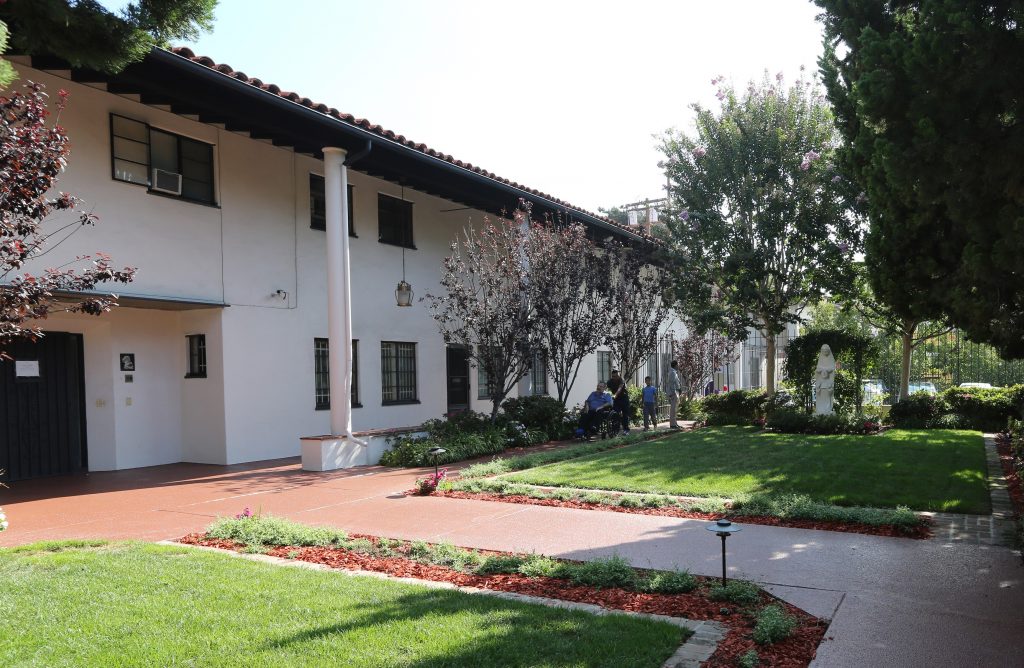Hidden beneath the Hollywood Sign overlooking a city famed for materialism, a community of cloistered Dominican nuns has prayed for nearly a century for the people of Los Angeles, for all who suffer worldwide, and for neighbors who come to them with their troubles.
Now the Monastery of the Angels is down to its last few members, the majority of whom have asked the Dominican order to close their community. Neighbors, preservationists, and longtime volunteers at the monastery have expressed alarm about the sisters and the property. As of Friday afternoon, more than 2,300 people had signed a petition asking for the monastery to be kept open.
A statement from the Dominican order said that “no decision has been made to sell.” Lay workers will continue to make and market the monastery’s popular candy and pumpkin bread, it said.
“The decision is not final,” local prioress Sister Maria Christine, OP, told Angelus. “We are in the process of exploring all possible alternatives and open to a solution that would preserve the chapel of adoration, gift shop, and religious environment of the property. I concur that something must happen, but I don’t know exactly what this might be.”
As deaths outstripped vocations, the nuns had spent years discerning what to do if they could no longer maintain the monastery, she said. When they were down to about 10 members, “the COVID-19 virus hit our community hard last Christmas and left us with a devastating outcome,” Sister Maria Christine said.
Of four sisters who contracted it, three died within two weeks. Two more died of other causes.
“Perhaps this is all in God’s divine providence, but it was a huge shock for the community to lose our wisdom figures, those who had a stockpile of memories from the early days, those who rejoiced as the community grew and those who prayed tirelessly for the people of Los Angeles,” she said.
Many in Los Angeles appreciated those prayers.
Richard Schave and Kim Cooper aren’t Catholic but include the Monastery of the Angels on their “Esotouric” tours of historic Hollywood. They brought visitors to Mass to witness cloistered spirituality.
While the 1924 architecture by Wallace Neff, a designer of iconic movie star mansions, is significant, Schave and Cooper express deeper concern for the monastery’s spiritual contributions.
“A building is so important to its community because of the affective ownership that the community feels, the sense that it belongs to them as a place of worship,” Schave said.
They worry about what would happen if the Dominicans sell the ultra-prime real estate.
If the nuns leave, they hope the Church will offer the property to “another contemplative community of a similar type, who would live and pray in a similar fashion,” Cooper said.
A statement from the Dominican Order said that the monastery no longer meets canonical or Dominican requirements for a viable community, but thanked those who have expressed concern.
“Our prayers are always with our community of friends and neighbors, and [we] hope that our monastery will continue to be a house of prayer and service for years to come,” it said.
The community was founded in 1924 by a New Jersey nun, Mother Mary of the Eucharist, whose devotion to angels drew her to the City of Angels. The property was purchased in 1934. The sisters have prayed around the clock for movie moguls, the homeless, disaster victims, and the salvation of souls. They supported themselves as bakers and candymakers, achieving fame for their pumpkin bread.
The monastery once had scores of sisters, founding offshoots in Pakistan and the Philippines. Of five sisters currently in residence, “two are infirm or disabled and are preparing to move to a facility where they can receive appropriate care for their level of need,” Sister Christine said.
Each sister can choose where to relocate.
Under Church law, a monastic community must have enough sisters capable of forming a governing council, providing spiritual leadership, and continuing the community’s God-given mission, Sister Christine said.
“The Monastery of the Angels is seriously lacking in all of the above,” she said. “This includes our ability to elect a prioress and council, hold chapter, have common life, the choral celebration of the liturgy of the hours, private prayer, adoration, and study of sacred truth.”
Consequently, “the majority vote of the nuns favored closure,” she said. Their recommendation is being discussed at higher levels of the order in Rome before it is submitted to the Holy See for a final decision. Under Church law, Archbishop José H. Gomez of Los Angeles is consulted but has no authority to intervene.
A statement from the archdiocese expressed gratitude for the nuns’ presence “and entrust their future to their religious superiors, who are committed to their care and well-being.
“The archdiocese is in contact with the Dominican Order with the hope that religious services can continue at the monastery, keeping the chapel open and available for the community,” the statement read.
The Dominicans said that “the order will continue to explore possibilities for the future. It is our hope to maintain the chapel for worship and prayer. The gift shop, pumpkin bread bakery, and famous chocolate candy making will continue to operate with the expertise of our current lay personnel.”
Note: The sweets are for sale online at www.monasterygoodies.com and in the gift shop of the Cathedral of Our Lady of the Angels.

